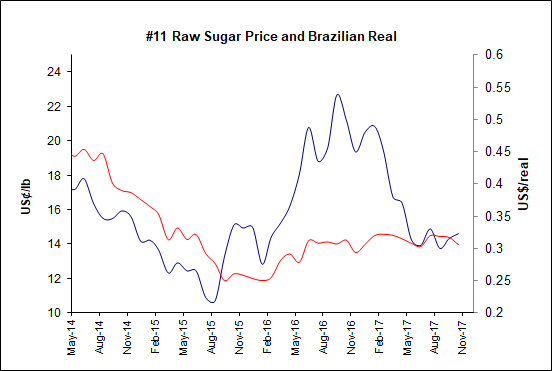Sugar Industry News : November 2017
Welcome to our news page where we try to bring you the latest news and comment but it will always be a better place if you send us your news. You can write to us by clicking on the Contact link above.
WORLD PRICE
There was a lot of talk about the impact of the EU regime change last month but no real impact on the price :

Perhaps we are in for a period of a relatively stable price?
1 MILLION TONS OF PHYSICAL DELIVERED AS OCTOBER CLOSED
When the October book closed at the start of last month, just over 1 million tons of physical sugar were delivered, most of it [720 000 tons] being taken by Wilmar. Most surprisingly, 50 000 tons was taken by Raizen, the Brazilian producer. Everything points to people being caught out by the price and opting to take the physical rather than swallow the loss.
PAKISTAN IMPOSES EXPORT CONDITIONS
Last month we reported that the Pakistan government was allowing 500 000 tons of subsidised export in order to reduce the national stock of about 7 months' demand. It has now emerged that the subsidy is on a sliding scale related to the world price and requires that the factories all crush at full capacity throughout the crop just starting.
INDIA MUST BE VERY TIGHT ON SUPPLY
It is becoming apparent that the assurances of the Indian Sugar Mills Association [ISMA] that factories would start an early crush to get 2017/18 sugar into the market were not correct. It had stated that 800 000 tons of sugar would be produced in October but it seems that 300 to 350 000 is more like the actual production. The numbers have to be viewed from the country's mean monthly consumption of about 2 million tons and the time delay in getting from the factories to the consumers.
DISPARITIES BETWEEN INDIA 2017/18 FORECASTS
There seems to be quite some differences of opinion as to what the Indian production will be for the crop just started. The USDA half year report was published at the very end of September with a prediction for 2017/18 of 27.7 million tons. That is 10% above the federal government's own forecast and stands in sharp contrast to that of say Kingsman of 25.5 million. Let's see as the crop proceeds.
THAILAND INTRODUCES A BEVERAGE TAX
Thailand is the latest country to introduce a tax on sugar in beverages which it did in mid-September. In the case of Thailand the tax is a progressive one ranging from about US 0.3¢ per litre for sugar levels between 6 and 8% up to 3¢ per litre for sugar levels above 14%. The USDA thinks that the impact of the tax will be to cut the domestic consumption by 1 to 2%.
QUEENSLAND RETAINS FARMERS' CHOICE
Last month we reported on the move by one Australian senator to set aside the cane farmers' choice as to who markets the sugar made from the cane they sold. That choice was imposed on the Queensland industry by the federal government earlier this year. In October the move to rescind the imposition was debated in Canberra but the motion was lost.
MACKAY SUGAR STILL IN DEEP TROUBLE
Mackay Sugar – which operate four factories in Queensland – seems to have failed to sell its new electrical export station at the Racecourse factory and hasn't managed to sell the Mossman factory so still needs to raise Aus$ 144 million. The current talk is that one of the other companies that operate factories in Queensland may buy Mackay. That won't go down well as all of the potential buyers are controlled by foreign groups.
BRAZIL CANE SUGAR CONTENT HIGH BUT ETHANOL BIAS INCREASES
Brazil is reporting 15.9% sucrose in cane, up some nine percent on last year. Normally that would depress the world price but the country is also reporting more sucrose going to ethanol rather than crystal sugar and the total crush is a bit lower than expected [although it is more to do with factory maintenance than a lack of cane].
PHYTOLIN IS NOT DEAD
Some years ago we reported on a company in northern Queensland working on low glycaemic index [Low GI] sugar. The company, Phytolin Pty Ltd, seems to have gone bankrupt but, apparently, its work continues. The process involves using solvent extraction to extract polyphenols, flavonoids and other chemicals from, typically, molasses. The resultant extract is claimed to lower the availability of carbohydrates for digestion. Another Queensland company, a chocolate specialist, has now launched a low GI chocolate product using phytolin and, by the sounds of it, bagacillo.
